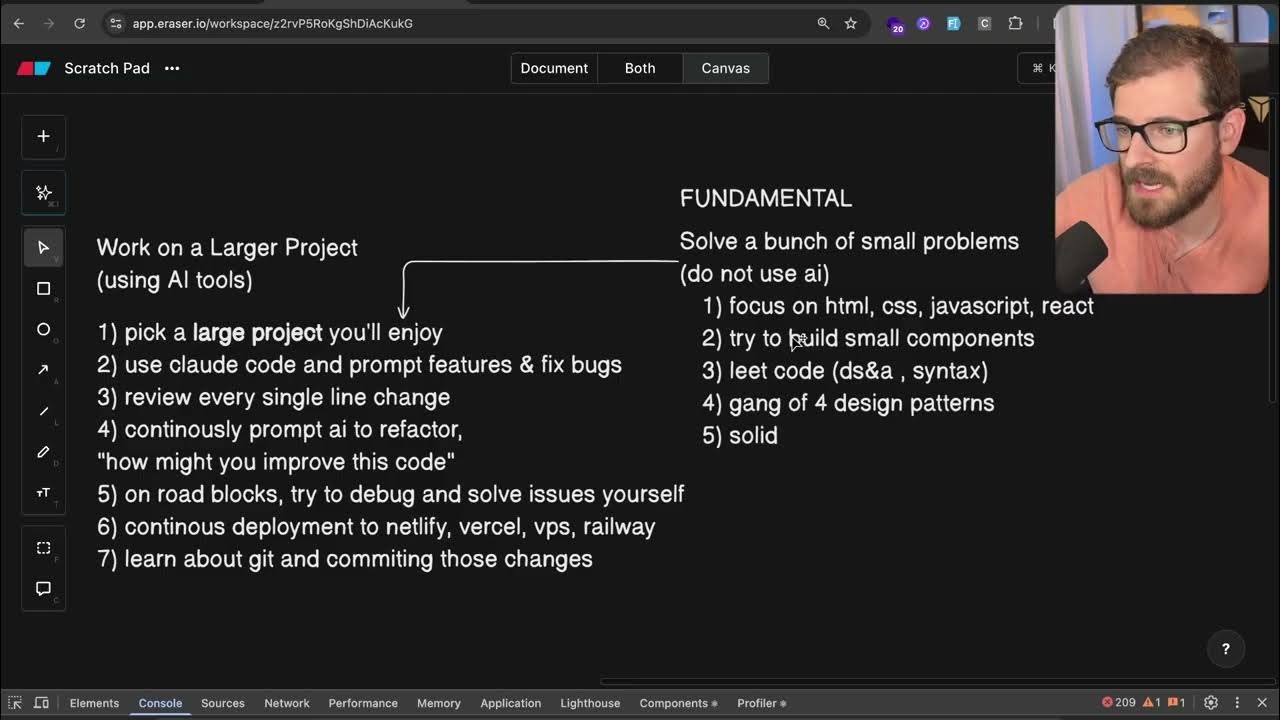Learn To Code Like a PRO and Not Waste Time
Summary
TLDRThis video script emphasizes the challenges of learning to code and offers a roadmap for success. It highlights the importance of embracing struggle as a learning opportunity, focusing on problem-solving rather than syntax, and finding the right learning medium. The speaker recommends creating a learning roadmap, engaging in consistent practice, and tackling difficult projects to accelerate progress. The script also promotes the use of interactive platforms like Brilliant for hands-on learning and concludes with encouragement to persevere through challenges.
Takeaways
- 😌 Learning to code is challenging and requires embracing struggle as a part of the process.
- 💡 The most significant learning occurs during moments of difficulty and frustration.
- 🛠 Becoming a proficient programmer involves problem-solving and overcoming obstacles.
- 🎯 Focus on understanding problems and solving them, rather than just memorizing syntax or features.
- 🔍 Identify your most effective learning medium, whether it's auditory, visual, or hands-on.
- 📚 Experiment with various learning resources to find the best fit for your style and needs.
- 🗺️ Create a roadmap with clear goals and a step-by-step plan to guide your learning journey.
- ⌨️ Practice is essential; spend most of your learning time actively coding and applying concepts.
- 🏆 Aim to build complex projects to challenge your skills and enhance your problem-solving abilities.
- ⏳ Recognize that becoming proficient in coding is a long-term commitment requiring consistent practice and learning.
Q & A
What is the main challenge most people face when learning to code?
-The main challenge is that most people don't know how to learn effectively for coding, which is different from traditional subjects taught in school.
Why is struggling considered a part of the learning process when coding?
-Struggling is part of learning to code because it's during these difficult and frustrating moments that one learns the most, especially when persevering through obstacles.
What is the role of problem-solving in becoming a proficient programmer?
-Problem-solving is central to programming, as programmers primarily identify and solve problems. The more one practices this, the better they become at programming.
Why should one not focus solely on syntax and features when learning to code?
-Focus should be on understanding how to take a problem and solve it, rather than just memorizing syntax and features, to become a competent programmer.
How does the speaker suggest accelerating one's learning process in coding?
-The speaker suggests using resources like Brilliant, which offers interactive lessons and emphasizes understanding the 'why' behind each concept.
What is the significance of daily consistent learning in programming, according to the script?
-Daily consistent learning is crucial in programming as it allows for the acquisition of meaningful knowledge in small, manageable sessions, which can replace idle screen time.
How does the speaker recommend determining the best learning medium for coding?
-The speaker recommends trying out different mediums such as books, videos, podcasts, and in-person classes to figure out which one resonates best with the individual.
Why is creating a roadmap important when learning to code?
-A roadmap is important as it provides a structured guide on what to learn, ensuring that the learning process is directed towards specific goals and progress can be tracked.
What does the speaker suggest should be the primary activity during a coding learning session?
-The speaker suggests that the majority of a coding learning session should involve writing code, with other resources like videos or articles serving as guides.
How does the speaker encourage learners to tackle the challenge of programming?
-The speaker encourages learners to challenge themselves by working on difficult projects, comparing it to lifting heavier weights at the gym to get stronger.
What is the final advice the speaker gives to aspiring programmers?
-The final advice is to repeatedly challenge oneself with difficult projects and to understand that becoming a good programmer requires a lot of practice and continuous learning.
Outlines

このセクションは有料ユーザー限定です。 アクセスするには、アップグレードをお願いします。
今すぐアップグレードMindmap

このセクションは有料ユーザー限定です。 アクセスするには、アップグレードをお願いします。
今すぐアップグレードKeywords

このセクションは有料ユーザー限定です。 アクセスするには、アップグレードをお願いします。
今すぐアップグレードHighlights

このセクションは有料ユーザー限定です。 アクセスするには、アップグレードをお願いします。
今すぐアップグレードTranscripts

このセクションは有料ユーザー限定です。 アクセスするには、アップグレードをお願いします。
今すぐアップグレード関連動画をさらに表示

Earning Online is F*king HARD... Until You Know This

Jack Mas life changing advice for young people

Learning Data Engineering Skills: Essential Advice and My Journey

How I Became FLUENT in FRENCH in 1 Year!

The Paths I'd Take to Become a Software Engineer

What To Do When You Think You've Lost All Your Progress As A Trader
5.0 / 5 (0 votes)
